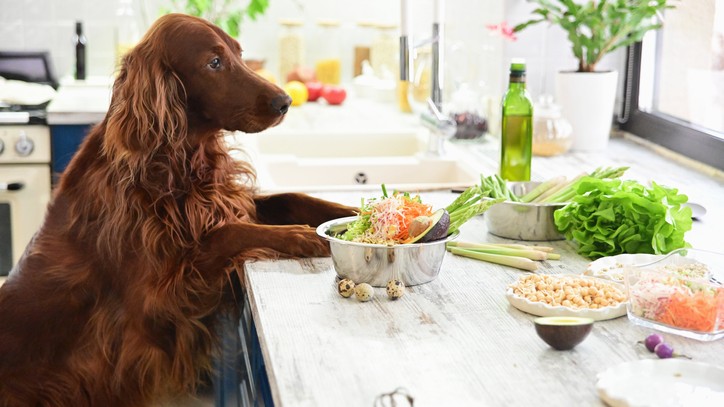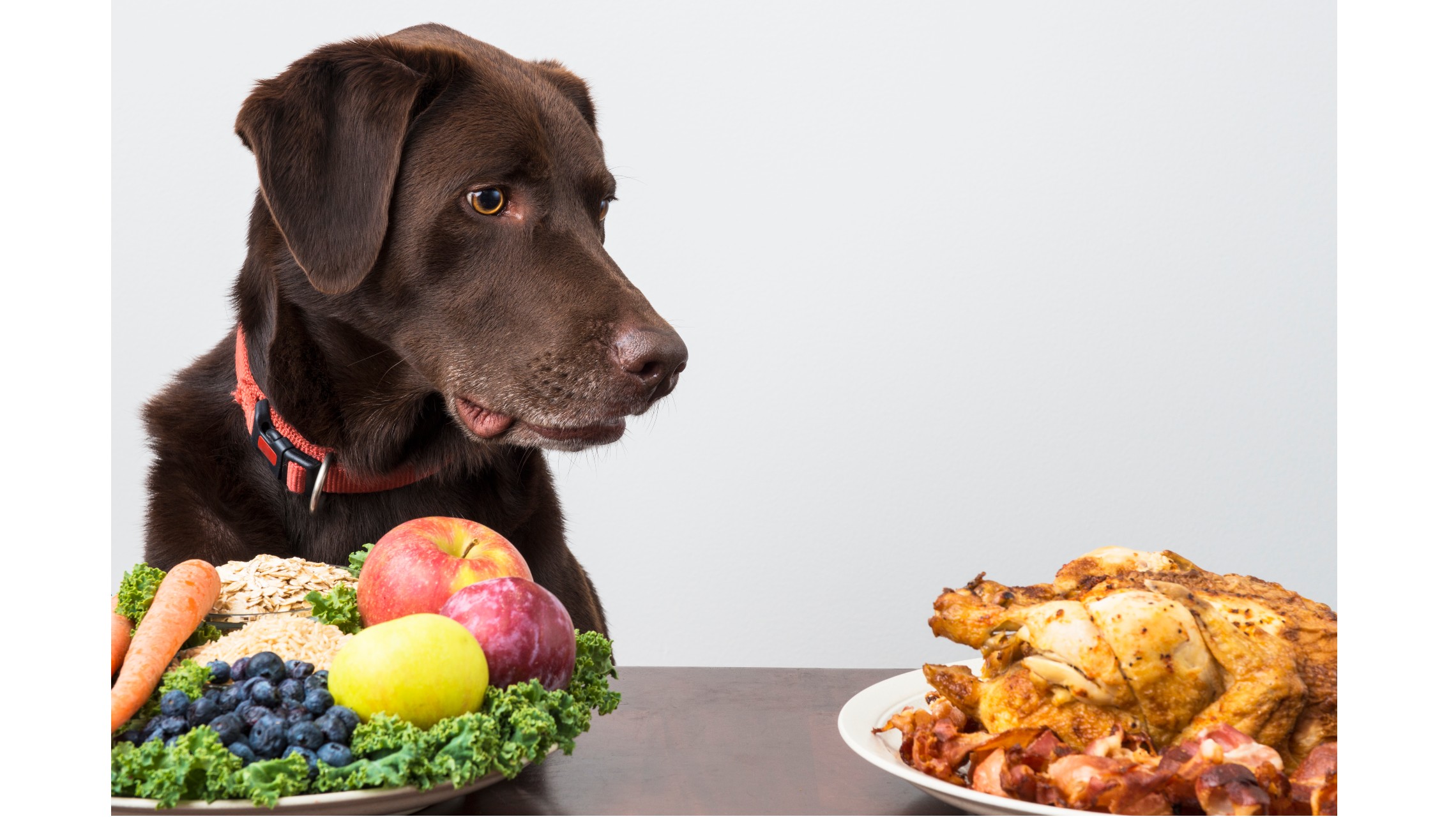Can a dog be vegan? We asked a vet…
We asked a vet “Can a dog be vegan?”. Here’s what she said…

With climate change and ethical considerations turning lots of people towards veganism, you might be wondering ‘can my dog be vegan, too?’ After all, dogs are descended from wolves, and I don’t know a dog that would turn down a steak – but is it okay to make a dog be vegan? And can dogs be healthy if they’re vegan? Let’s take a look at the science.
Are dogs carnivores?
The first thing to consider is whether dogs are carnivores or not. Whilst that might sound like a simple question to answer, it isn’t. Vets, scientists, and nutritionists still can’t agree on whether dogs are omnivores (eat meat and plants) or carnivores (eat mostly or entirely meat). We know that the dog’s intestines are longer than a cat of similar size, meaning they’re better able to digest plant-based foods. However, they’re not great at fermenting foods, which is what is really necessary to get the best from plants. And whilst dogs have genes to digest grains that wolves do not, they’re still a tiny step on the road to evolution.
On balance, it’s probably best to say that dogs are carnivores that have adapted to a more omnivorous diet. They’re able to digest plant-based sources of foods, including grains, legumes, roots, and leafy vegetables. In fact much of the best dog food has plant-based ingredients as well as meat.
Are vegan diets safe for dogs?
The real question is, is it safe for dogs not to eat any meat or animal-based protein at all? Well, firstly, dogs are not ‘obligate carnivores’ (but cats are). An obligate carnivore has to eat meat, because they can’t get the right amino acids without it. That means that, theoretically, a dog can eat a plant-based diet and gain the right amino acids either from the plants, or from manufacturing their own in their liver. In fact, small pilot studies have shown that meat-free diets are safe for dogs, even high-activity sporting dogs.
The main concern with the safety of vegan diets is that they tend to make the urine more alkaline. This can lead to the formation of urine crystals and stones, which can be painful and may need surgery to remove. Methionine is a type of amino acid that isn’t naturally occurring in a plant-based diet. Although dogs don’t need it to survive, it should be added to the diet in order to acidify the urine and prevent the formation of crystals.
What about vitamins and minerals? Well, as long as the diet is ‘complete and balanced’, and appropriate for your dog’s lifestage, your dog should be receiving the correct nutrition. Diets can be ‘formulated’ to be complete and balanced, which means a computer has checked the recipe, or it can pass a feeding trial. If possible, find a diet that has had feeding studies done, as this is a more accurate method of proving that dogs can actually absorb all the nutrients found in the diet.
The main vitamin lacking in plant-based foods is Vitamin D3, which comes from lanolin (sheep’s wool) in most pet foods. Obviously, this isn’t completely plant-based, but manufacturers have to choose between using this or using the version that comes from lichen/yeast, which hasn’t been thoroughly tested yet. It’s worth saying that it doesn’t harm the sheep to get the lanolin – in fact, the wool has to be sheared to keep the sheep comfortable and healthy. It’s like a haircut!
Get the best advice, tips and top tech for your beloved Pets
The bottom line is, if your dog’s food says ‘complete and balanced’, it will contain sufficient Vitamin D3. But, if using any animal products is against your beliefs, check carefully for the Vitamin D3 source. You may have to call the manufacturer to find out more.

Can I buy vegan dog food?
With the importance of finding a complete and balanced diet, it’s definitely worth looking at purchasing a FEDIAF-approved or AAFCO-approved ‘complete and balanced’ diet, which shows that the diet provides nutrients at the levels determined in scientific studies. Getting the right nutrients, in the right amounts, is difficult in any home-made dog food, but harder in vegan diets. If you do want to home cook your dog’s food, it’s strongly recommended that you ask a veterinary nutritionist to help you with the recipes, as online ‘recipes’, even those written by vets, are often not nutritionally complete.
The good news is that there are a few vegetarian and vegan diets on the market, and more are being launched all the time. There are some that come recommended by vets, and there’s even some that have been formulated by vets and veterinary nutritionists working together. It’s important to be aware that some of these are not truly vegan, due to the issue with Vitamin D3. And don’t forget to check that they’ve added methionine, to acidify the urine.
Are there other environmentally-conscious pet food choices?
Insect protein diets have recently been launched, which are a great way of getting a larger amount of protein to dogs but without a large environmental footprint. Lab-grown ‘meat’ is also being explored for owners of dogs who prefer to feed meat.
Conclusion
Vegan dog food is fairly new in the world of dog food nutrition, and many vets and pet owners are still a little cautious about feeding it, especially with dogs sitting right on the line between carnivore and omnivore. However, there are some great vegan diets out there that are complete and balanced and might be worth a try. Remember, if your dog has any medical conditions or is prone to an upset stomach, it’s best to talk to your vet before switching their food.
After graduating as a vet from the University of Nottingham in 2016, Dr. Joanna Woodnutt went on to practice companion animal medicine in the Midlands. She quickly developed a love of consulting and helping clients with medical problems such as dermatology, behavior and nutrition - anything that involved helping clients understand their pets better.
Jo started writing about pet health in 2017, realizing that it meant she could help even more pet parents. Since then, she has written for countless online and print publications and is a regular contributor for Edition Dog Magazine. Jo is the director of The Veterinary Content Company, which she founded in 2020. She is also the founder of Petlearnia, a platform that provides pet e-learning courses for pet parents.
Jo now lives in the Channel Islands with her husband Ian and terrier Pixie.

